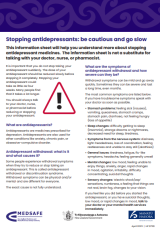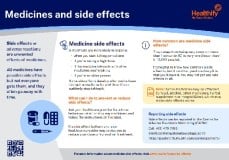You can now add Healthify as a preferred source on Google. Click here to see us when you search Google.
Imipramine
Sounds like 'im-ip-ra-meen'
Key points about imipramine
- Imipramine is used to treat depression.
- It belongs to a group of medicines called tricyclic antidepressants (TCAs).
- Imipramine is also called Tofranil®.
- Find out how to take it safely and possible side effects.

Imipramine belongs to a group of medicines called tricyclic antidepressants. In the past, these medicines were commonly used for depression but today doctors usually prescribe newer classes of antidepressants.
Tricyclic antidepressants are used for severe depression or when other antidepressants are unsuitable. Read more about antidepressants.
In Aotearoa New Zealand, imipramine is available as tablets in different strengths – 10 mg and 25 mg. It's available with a prescription written by a prescriber.
If you need help or want to talk to somebody about your mental health, you can get support from any of the following:
- Free call or text 1737 any time for support from a trained counsellor
- Lifeline 0800 543 354 (0800 LIFELINE) or free text 4357 (HELP)
- Suicide Crisis Helpline 0508 828 865 (0508 TAUTOKO)
- Healthline 0800 611 116
- Samaritans 0800 726 666.
- Always take your imipramine exactly as your healthcare provider has told you. The pharmacy label on your medicine will tell you how much imipramine to take, how often to take it, and any special instructions.
- The dose of imipramine will be different for different people.
- Your healthcare provider will usually start you on a low dose and increase this slowly. This allows your body to get used to the medicine and reduces side effects. Imipramine may be prescribed as a single dose to be taken at bedtime, or it may be prescribed in smaller doses taken 2 or 3 times a day.
- If your tablets look different to your last supply, ask your healthcare provider or pharmacist for advice.
- Timing: Take imipramine at the same times each day. Swallow your imipramine tablets with a glass of water.
- Food: You can take imipramine with or without food.
- Missed dose: If you forget to take your dose, take it as soon as you remember. But if it's nearly time for your next dose, just take the next dose at the usual time. Don't take double the dose. If you have trouble remembering when to take your medicines see tips to help you remember to take your medicines regularly. You might find a medication reminder app helpful.
Here are some things to know when you're taking imipramine. Other things may be important as well, so ask your healthcare provider what you should know about.
- Driving: Imipramine can make you feel tired or dizzy. Be careful when driving or using tools until you know how this medicine affects you.
- Alcohol: Avoid alcohol while you're taking imipramine, especially when you first start treatment. Drinking alcohol while taking imipramine can make you feel drowsy and affect your concentration, putting you at risk of falls and other accidents. It can also cause agitation, aggression and forgetfulness. If you do drink alcohol, drink only small amounts and see how you feel. Don't stop taking your medicine.
- Other medicines: Imipramine interacts with many other medicines, herbal supplements (eg, St. John's Wort) and rongoā Māori, so check with your healthcare provider or pharmacist before starting imipramine or before starting any new medicines, products or supplements.
- Keep taking imipramine every day: It may take a few weeks before you start to feel better. Initially, you may begin to notice you feel less irritable and worried.
- Smoking: Sudden changes in the amount of cigarettes you smoke can change how imipramine works in your body. If you’re a smoker, talk to your healthcare provider about this.
- Sun protection: Imipramine can make your skin more sensitive to the sun, even on a cloudy day. This can cause a burning, tingling feeling on your skin when you're in the sun, or you may notice redness. When outside, protect your skin and eyes by using a good sunscreen (at least SPF30+) and wearing sunglasses, a sunhat and clothing that protects you from the sun. Don’t use sunbeds.
- Diabetes: If you have diabetes, you may need to check your blood glucose more often because imipramine can affect the levels of glucose in your blood.
- Pregnancy or breastfeeding: Talk to your healthcare provider if you're pregnant, planning a pregnancy or want to breastfeed.
- Don't stop suddenly: If you think imipramine isn't working for you, don't stop taking it suddenly. Talk to your healthcare provider before stopping. The dose is usually gradually reduced to avoid side effects.
Like all medicines, imipramine can cause side effects, although not everyone gets them. If you're concerned about any symptoms you think might be related to your medicine, talk to your healthcare provider. The following information offers some guidance but doesn't include all possible side effects.
Suicidal behaviour
The use of antidepressants has been linked with self-harm or suicidal thoughts and behaviour. Children, teenagers, young adults and people with a history of suicidal behaviour are most at risk. This is most likely during the first few weeks of starting treatment or if the dose is changed. It's important to look out for signs of suicidal behaviour eg, suicidal thoughts, self-harm, worsening of low mood, agitation or aggression.
If you notice any of these signs, contact your healthcare provider immediately. If you need urgent help or are concerned, phone:
- Lifeline 0800 543 354 (available 24/7), or
- Healthline 0800 611 116, who can give you the phone number for your local mental health crisis line.
Common side effects
Tell your healthcare provider if these side effects bother you.
- Feeling sleepy, drowsy or tired, blurry vision: It may be best to take imipramine at bedtime. Be careful when driving or using tools until you know how this medicine affects you. These effects put you at risk of falls and injuries, especially if you’re an older person. Don't drink alcohol.
- Feeling dizzy, faint or lightheaded: Get up slowly when rising from a sitting or lying position. These effects put you at risk of falls and injuries, especially if you’re an older person.
- Dry or sore mouth, constipation: Read more for advice on managing dry mouth and constipation.
- Trouble peeing.
- Anxiety or restlessness, tremor.
- Weight gain.
- Less interest in, or trouble having sex.
Tell your healthcare provider immediately or phone Healthline free on 0800 611 116 if these occur
- Signs of serotonin syndrome such as feeling agitated and restless, heavy sweating, shivering, fast heart rate or irregular heartbeat, headache, diarrhoea and rigid or twitching muscles. You’re at increased risk of serotonin syndrome if you recently started taking imipramine, recently increased the dose or you're taking other medicines that can cause serotonin syndrome.
- Flushing, headache, restlessness.
- Symptoms of a fast or irregular heartbeat such as fluttering, pounding or pain in your chest, dizziness or fainting.
Phone 111 for an ambulance or go to your nearest accident and emergency (A&E) clinic if these occur
-
Signs of an allergic reaction such as itchy skin, and rash, swollen lips or tongue, problems breathing, like a tight chest or shortness of breath.
Read more about medicines and side effects and reporting a reaction you think might be a side effect.
The following links have more information on imipramine.
Tofranil(external link) Medsafe Consumer Medicine Information, NZ
Imipramine(external link) New Zealand Formulary Patient Information
Brochures
Stopping antidepressants: be cautious and go slow(external link) Medsafe, NZ, 2023
Medicines and side effects(external link) Healthify He Puna Waiora, NZ, 2024
5 questions to ask about your medications(external link) Health Quality and Safety Commission, NZ, 2019 English(external link), te reo Māori(external link)
Apps
Mental health and wellbeing apps
References
- Imipramine hydrochloride(external link) New Zealand Formulary
- Antidepressant drugs(external link) New Zealand Formulary
- Tofranil(external link) Medsafe datasheet, NZ
- The role of medicines in the management of depression in primary care(external link) BPAC, NZ, 2021
- Generalised anxiety disorder in adults(external link) BPAC, NZ, 2024
- Anticholinergic burden in older people(external link) BPAC, NZ, 2024
Brochures
 Stopping antidepressants: be cautious and go slow
Stopping antidepressants: be cautious and go slow
Medsafe NZ and Ministry of Health, NZ, 2023

Medicines and side effects
Healthify He Puna Waiora, NZ, 2024

Health Quality and Safety Commission, NZ, 2019 English, te reo Māori
Credits: Healthify editorial team. Healthify is brought to you by Health Navigator Charitable Trust.
Reviewed by: Stephanie Yee, Pharmacist, Auckland.
Last reviewed:





